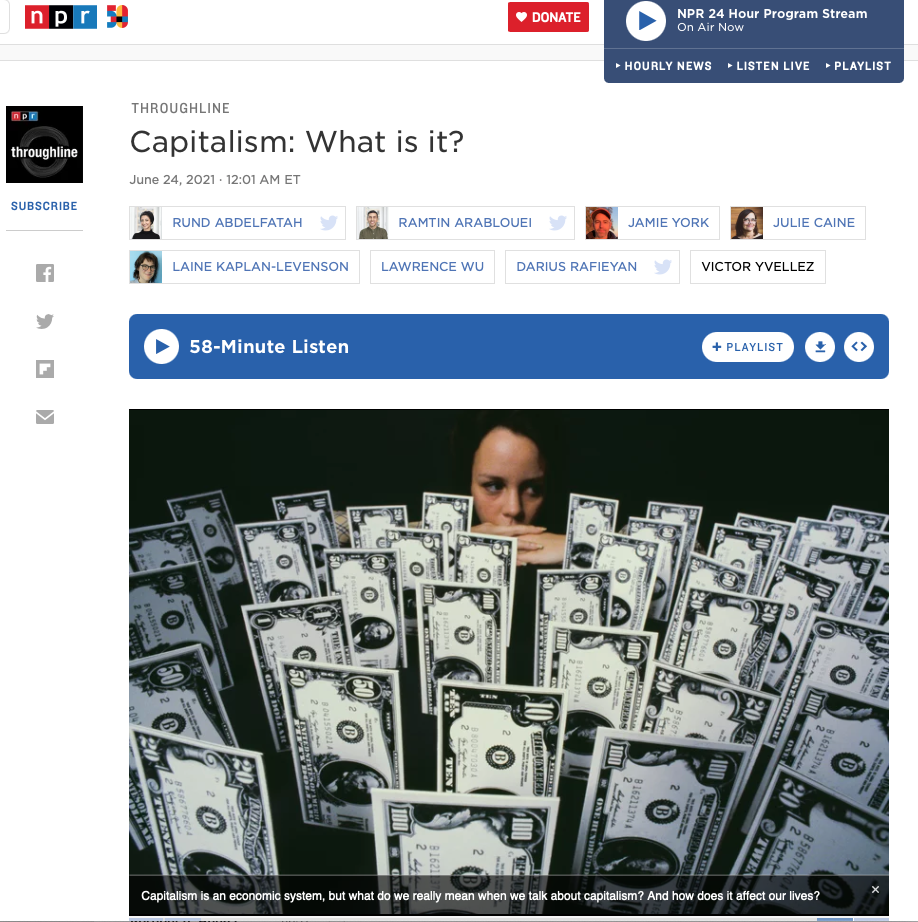On the front page!
The French version of my article is live and featured on the online front page of the July edition of Le Monde Diplomatique. It’s a DREAM come true! The direct link is here.
Proofs of my forthcoming article in Le Monde Diplomatique
These are the French proofs of my article forthcoming in the July edition of Le Monde Diplomatique in both French and English. I am so excited that it will be featured as the middle two-page spread in both editions.
NPR Throughline podcast - What is Capitalism? →
This debate which I did little while ago dropped today on the NPR website. For the record, the conversation that Vivek, Bryan, and I had was about an hour and forty-five minutes, which was then edited down to about 45 minutes. I did have more to say about the role of neoliberal economics in Eastern Europe, but it got cut.
Summer Reading: Bride of the Revolution
“If the heavenly city of Communism could have been entered by dint of Krupskaya’s labors, Russia would have become the world’s first perfect society years ago.”
New interview with Revolutionary Left Radio →
Always a pleasure to be on the show, and especially when I get to speak for an hour about Kollontai!
The Portuguese cover is here! →
And the Portuguese translation is coming in a few weeks, just in time for summer.
Video interview with Elena Lagadinova from December 2014
This morning I was looking through some old external hard drives and I found about an hour of video footage from various interviews I conducted with Elena Lagadinova in December 2014. For a long time I have been meaning to subtitle these and post them online, but I only know how to use iMovie and it is tedious work for which I’ve never been able to find the time. I did do one clip with subtitles, which is linked here.
Discussion of Maria Todorova's Wonderful Book! →
This discussion of Maria Todorova’s latest book, "The Lost World of Socialists at Europe’s Margins: Imagining Utopia, 1870s-1920s" (Bloomsbury, 2020), features remarks by Ulf Brunnbauer, Theodora Dragostinova, Kristen Ghodsee, and Larry Wolff, followed by Maria Todorova’s response and Q&A with the audience.
Basset humor
Truth
Video from our FPRI book launch of Taking Stock of Shock →
From this afternoon at the Foreign Policy Research Institute in Philadelphia
Summer Reading: Imaging Utopia by Maria Todorova
A history of Bulgarian radicals - what’s not to like!
My comments on the book: Imagining Utopia: The Lost World of Socialists at Europe’s Margins
In her chapter on Angelina Boneva, Todorova introduces us to the idea of the “extraordinary” ordinary person,” someone whose life is not representative of some statistical average or of a particular subgroup of some clan of acknowledged historical significance, but a fully autonomous individual whose life and work deserves to be remembered on its own terms, as a legacy of one particular mind in one particular moment in time. As an ethnographer, this question of significance forever haunts my discipline, especially in an era of big data where everyone is keen to understand some imagined concept of public opinion or popular preferences in order to manipulate, deceive, subvert, or most likely, market to it. When the citizens of every continent are microblogging the daily minutia of their lives on platforms like Facebook, Twitter, Instagram, or TikTok, those harvesting this content see its value only in its aggregation and monetization. But the discipline of cultural anthropology demands that we take individuals and small communities as representatives of something deeper, always looking for clues to the universality of human experience despite the many differences that divide us.
In her chapter on Todor Tsekov, Todorova tells us that his handwritten “memoir-diary” of over 1100 pages only constituted the first 4 volumes of a ten-volume set. Todorova reflects, “excluding novelists and a few politicians, I have never encountered such graphomania in anyone” (205). Her mention of the word “graphomania” reminded me of one of my favorite pages of Milan Kundera’s The Book of Laughter and Forgetting when he meets a graphomanaical taxi driver. Kundera writes:
Graphomania is not a desire to writer letters, personal diaries, or family chronicles (to write for oneself or ones close relations) but a desire to write books (to have a public of unknown readers)… For everyone is pained by the thought of disappearing, unheard and unseen, into an indifferent universe, and because of that everyone wants, while there is still time, to turn himself into a universe of words.
The many rich lives that Todorova rescues from oblivion in her book, extraordinary ordinary people like Angelina Boneva, Todor and Katia Tsekov, Koika Tineva and Nikola Sakarov, as well as the many glimpses of socialist women and wives, allow us to find the universality in the specificity of these lives: their overwhelming desire to build a better world. Their imagining of utopia.
“Every daring attempt to make a great change in existing conditions, every lofty vision of new possibilities for the human race, has been labeled Utopian, explained Emma Goldman in 1911.” The German sociologist Karl Mannheim also argued that utopia was a necessary antidote to ideology, which he defined as the unseen but omnipresent social, cultural, and philosophical structure of ideas that uphold a particular “order of things” protecting those who hold political and economic power. “Inasmuch as man is a creature living primarily in history and society,” Mannheim wrote in 1929, “the ‘existence’ that surrounds him is never ‘existence as such,’ but is always a concrete historical form of social existence… The representatives of a given order will label as utopian all conceptions of existence which from their point of view can in principle never be realized.” In other words, those who benefit from the status quo have a strong motive for labeling as “utopian” any ideas which threaten it. But even beyond that, those steeped in the ideology of their current existence quite literally cannot imagine an alternative to it. And most people just follow along.
But Todorova’s beautiful book shows us that there have always been dreamers, like these lost socialists on Europe’s margins, refusing to accept the status quo. Fighting for women’s rights, for improvements in the lives of peasants and workers, for worlds free from exploitation and misery, and for more democratic forms of political participation. Their dreams may have had different contours, and we know that there are always conflicts among people with different visions of the ideal future, but we also know from history that it is these dreamers that move our societies forward. Behind the great men and women (but usually men) who are written about in history books, there are billions of “extraordinary ordinary” men and women who have devoted their lives for causes bigger than themselves alone, and these causes gave purpose and meaning to their lives, helped order and structure their days, and allowed them to feel that they might not disappear “unheard and unseen, into an indifferent universe.”
In his 1863 novel What Is to Be Done?, Chernyshevsky outlined a utopian vision of the future where workers would finally enjoy the fruits of their own labor in his protagonist Vera Pavlovna's third dream sequence. "Tell everyone that the future will be radiant and beautiful," Chernyshevsky writes, "Love it, strive toward it, work for it, bring it nearer, transfer into the present as much as you can from it."
It is not easy to imagine a better future, a utopia out there floating on the horizon, when the crushing burdens of quotidian existence often limit our ability to dream. Tired and apathetic, most of us cling carelessly to the status quo, convinced by our societies that any attempt to change this will inevitably devolve into dystopia. By salvaging these moving lost life stories from Europe’s margins, Todorova has shown us the value and importance of social dreaming in an era when utopianism is still derided as useless at best and politically dangerous at worst. I think Todorova’s book shows us that the uncanny ability to believe in an unknown (but somehow better future)–to see the world not as it is but as it should be–is what makes these individuals extraordinary in their ordinary-ness, and for me this is ultimately a book of “individual close-ups” of hope, of the tenacity of the human spirit to think beyond suffocating ideological boxes of the present.
To end with the full quote from Oscar Wilde with which Todorova begins her book: “A map of the world that does not include Utopia is not worth even glancing at, for it leaves out the one country at which Humanity is always landing. And when Humanity lands there, it looks out, and, seeing a better country, sets sail. Progress is the realisation of Utopias.”
Fun to chat on the Nomiki Konst Show →
I was a guest on #FemFriday with Nomiki Konst on her YouTube show. My interview starts at 30:15.
My interview starts at 30:15
Summer reading: Comrade by Jodi Dean
This was a fun essay on political belonging, and reminded me of a conversation I had with a Bulgarian of Turkish ethnicity back in the late 1990s about the Bulgarian word for Comrade, Drugar. I wrote about this encounter for an essay in my 2011 book, Lost in Transition: Everyday Life After Communism.
Summer Reading–Red Love: A Reader on Alexandra Kollontai
Finally, the semester is over and I have some time to catch up on my reading. I literally have 17 books on my nightstand (or on the floor near it) waiting to be read or reread. I started off with this 2020 reader from an art project done in Sweden in the 2017-2018 academic year. It’s an eclectic collection of essays and interviews reflecting on the importance and relevance of Kollontai and her work today.
New podcast (in English) on Falter Radio in Austria →
Wirtschaftliche Selbständigkeit bringt Frauen besseren Sex, belegt die amerikanische Sozialwissenschaftlerin Kristen Ghodsee im Gespräch im Bruno Kreisky Forum. Ausgangspunkt ist eine schon seit langem bekannte Umfrage aus früheren Zeiten, wonach Frauen in der versunkenen DDR sich viel zufriedener über ihr Sexualleben geäußert haben als Frauen im kapitalistischen Westen.
Die Onlineveranstaltung am 12. Mai 2021 mit Kristen Ghodsee, moderiert von Tessa Szyszkowitz, ist in englischer Sprache.
I can't believe how much I missed this last year...
I like both Italy and France but for different reasons and would be happy to see either of them win. But Barbara Previ is an amazing singer and I like her song more because of those old school Edith Piaf vibes. Still the Italians are crushing it in the energy department.
Manifiesta in Belgium
I’m crossing my fingers that Americans will be allowed to travel to Europe again by the fall so I can actually attend this amazing event in person. A festival of solidarity on Zoom just won’t do…
The final book cover for Taking Stock of Shock
This is the final proof of the front and back of the book!
Wisdom from the Q continuum
Just rewatched Deja Q. I love John de Lancie so much.
Q to Data in “Deja Q” (Season 3, Ep. 18)



















